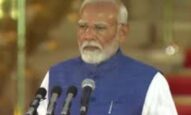New Delhi: Railway Minister Ashwini Vaishnaw informed the Rajya Sabha on Monday that rail accidents in the country have reduced by 90% since 2005-2006, emphasizing the government’s efforts to improve railway safety and enhance the infrastructure. Vaishnaw made these remarks while responding to a discussion on the Ministry of Railways’ demands for grants.
The Railway Minister highlighted that the reduction in accidents is a result of systematic efforts to tackle the root causes, including addressing design defects and improving the quality of infrastructure. He mentioned that while significant progress has been made, there is a continuing need to reduce accidents further and ensure better safety in the future.
Vaishnaw also focused on the environmental benefits of the railway system. He stated that railways are an environmentally friendly mode of transport, emitting 90% less carbon than road transport when using diesel engines. Additionally, with the shift to electric traction, emissions from trains are eliminated entirely. Since 2018-19, the savings on diesel fuel alone have amounted to Rs 29,000 crore, which highlights the positive impact of electrification.
Further discussing railway safety, the Minister reported a significant reduction in “weld failures,” which have decreased by 92%, and rail fractures, which have dropped from around 2,500 in 2013-14 to just 250 annually – a reduction of 91%. These improvements have been achieved through better staff training, enhanced maintenance practices, and upgrades to railway infrastructure.
In terms of passenger transport, Vaishnaw pointed out that the cost of carrying a passenger for one kilometer by train is Rs 1.38, while the fare charged is only 73 paise. This represents a 47% discount, resulting in an annual loss of about Rs 60,000 crore to the Indian Railways. Despite this, he mentioned that Indian railways’ freight charges remain the lowest compared to neighboring countries, with fares in developed countries being ten times higher.
The Railway Minister proudly stated that by the end of the financial year, Indian Railways would be ranked among the top 3 countries globally in terms of cargo carrying, with an expected total of 1.6 billion tons of cargo transported. Only China and the USA are ahead of India in this regard.
Vaishnaw also addressed ongoing rail projects in various states, particularly Kerala and West Bengal, where the progress of rail projects is hindered by land acquisition and law-and-order issues. He specifically mentioned projects like the Kolkata Metro, and overbridge and underpass constructions in West Bengal, which are facing delays due to state government-related obstacles. On the other hand, projects in states like Uttar Pradesh, Rajasthan, and Maharashtra are progressing rapidly.
Regarding some of the major achievements of the Modi government’s railway initiatives, Vaishnaw praised the completion of the Kashmir-Jammu railway project, which connects the Kashmir Valley to Jammu. He highlighted the successful construction of the Chenab Bridge, which stands 35 feet higher than the Eiffel Tower. The bridge is a remarkable engineering feat, built in challenging conditions due to the intensity of valley winds.
He also noted that since India’s independence, the total length of railway tunnels in the country was 125 kilometers, but between 2014 and 2025, 160 kilometers of new railway tunnels will be completed, marking a significant achievement.
Vaishnaw concluded by emphasizing the transparency with which the Ministry of Railways is working under the Modi government. He gave an example of the recent loco pilot examination, in which over 18 lakh candidates appeared across 346 centers in 15 languages. The exam was held in 15 shifts over five days and was conducted smoothly, further reflecting the efficient and transparent functioning of the railways under the current administration.
With these efforts, the Railway Minister reassured the Parliament of the government’s commitment to modernizing the railways and ensuring their safety and sustainability.

